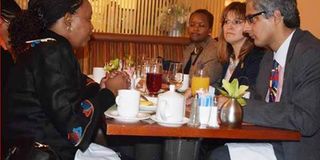Commonwealth to set up women procurement academy in Nairobi

Devolution CS Anne Waiguru (left) with the director of the Commonwealth Business Women's Network Mr Arif Zaman and other members of the Network during a breakfast meeting. The Commonwealth will set an academy in Nairobi to train women on procurement. PHOTO | COURTESY
What you need to know:
- The academy will train women on how to build their capacity so that they can take advantage of business opportunities within the government.
- The announcement was made by the executive director of the Commonwealth Business Women's Network Mr Arif Zaman.
- He was meeting Devolution and Planning Cabinet Secretary Anne Waiguru at Wardoff Astoria Hotel in New York Monday.
- The Commonwealth organisation invited Ms Waiguru to speak as a panellist at its side event on gender, trade, procurement and potential.
NEW YORK
Kenya's efforts to give women an opportunity to do business with the government has received a major boost, with the Commonwealth announcing it would set up a hub to train women on procurement.
The Commonwealth Business Women's Academy, to be established in Nairobi, will train women on how to build their capacity so that they can take advantage of business opportunities within the government.
The announcement was made by the executive director of the Commonwealth Business Women's Network, Mr Arif Zaman, during a breakfast meeting with Devolution and Planning Cabinet Secretary Anne Waiguru at the Wardoff Astoria Hotel in New York on Monday.
He praised Kenya's affirmative action programme that requires all public entities to reserve at least 30 per cent of their annual procurement budget to be spent on businesses owned by women, youth and the disabled.
Further, the Commonwealth organisation invited Ms Waiguru to speak as a panellist at its side event on gender, trade, procurement and potential.
This was based on the recognition that “Kenya is a leader on this matter having been the first country to pioneer the use of public procurement for the empowerment of women”.
The panel discussion centred on the role procurement can play in women's economic advancement in development.
Ms Waiguru’s presentation on the government's procurement programme and regulations, which was held on the on the sidelines of the Commission on Status of Women meeting at the United Nations headquarters, was given a standing ovation by the participants.
Other panellists described Kenya's procurement programme as an "exciting innovation on economic empowerment of women and a first in Africa and the Commonwealth'' region.
OVER 55,000 BUSINESSES REGISTERED
Ms Waiguru said that so far, more than 55,000 businesses owned by the special groups have registered under the procurement programme.
She told the meeting that the transformative initiative by the government, which comprises the Women Enterprise Fund, the Uwezo Fund and the Youth Enterprise Fund, as well as access to government procurement opportunities for women, youth and the disabled addresses "critical'' areas of the Beijing Platform for Action on Poverty and the Economy that are key to socio-economic advancement of women.
The Beijing agreement was made 20 years ago at the fourth World Conference on Women in China.
The implementation and a review of the Beijing resolutions are the major focus at the New York conference.
On Tuesday, the Ministry of Devolution and Planning will give an on overview of the programmes at a side event.
INFORMATION SHARING
"The side event provides a platform for information and experience sharing conducted through a panel discussion and a documentary,'' said Ms Waiguru.
"It will also include the legislative and policy frameworks on which the programmes are founded,'' she added.
Ms Waiguru will also lead her team, which includes representatives of interest groups such as the Kenya Private Sector Alliance.
During the Commonwealth Businesswomen Network presentation, Ms Waiguru said that by funding businesses owned by youth, women and the disabled, the government was expanding the tax base to create a sustainable competitive environment for business and employment opportunities.
Through the initiative, the groups in this category have access to $2.1 billion worth of business from the government annually while more than 6,500 businesses owned by the group have benefited from $102 million from the government.





